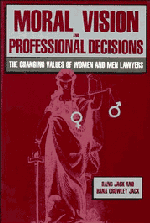Book contents
- Frontmatter
- Contents
- Preface
- Acknowledgments
- 1 Care and rights: two ways of perceiving the world
- 2 The lawyer's role: partisanship, neutrality, and moral distance
- 3 Personal morality: the orientation of lawyers toward rights and care
- 4 Personal morality and attorney role: changing perceptions of professional obligation
- 5 Women lawyers: archetype and alternatives
- 6 Toward a more morally responsive advocate
- Appendix I Coding Manual
- Appendix II Figures and tables
- Notes
- Bibliography
- Index
5 - Women lawyers: archetype and alternatives
Published online by Cambridge University Press: 16 September 2009
- Frontmatter
- Contents
- Preface
- Acknowledgments
- 1 Care and rights: two ways of perceiving the world
- 2 The lawyer's role: partisanship, neutrality, and moral distance
- 3 Personal morality: the orientation of lawyers toward rights and care
- 4 Personal morality and attorney role: changing perceptions of professional obligation
- 5 Women lawyers: archetype and alternatives
- 6 Toward a more morally responsive advocate
- Appendix I Coding Manual
- Appendix II Figures and tables
- Notes
- Bibliography
- Index
Summary
How do care-oriented lawyers, particularly women, adjust to the practice of law amid structures and attitudes long the province of male, rights-oriented thinkers? Here our concern is not with response to a given legal task or moral quandary but, rather, to the whole set of mores, forms, and assumptions that underlie the legal apparatus. Moving from individual instances, the problem here is reconciling systems of perceiving, valuing, and responding.
The rules of the game: preparation of the players
When lawyers talk about their work, they commonly liken it to a game. People in other professions — physicians, teachers, therapists, ministers, scientists — seldom use the term “game” to describe what they do. For attorneys, the metaphor is apt, in part, because law can be understood as a contest with rules, winners, and losers. An attitude of emotional detachment reinforces the idea that law is a game to be played for its own sake; the adversary nature of law makes it easy to maintain personal distance. From an attorney's point of view, moral neutrality is easily reinterpreted to mean “it's just a game,” even though the stakes are often high and lawyers get deeply invested in the contest. When taking part in a game, it is hard not to become preoccupied with winning, by whatever the prescribed rules.
- Type
- Chapter
- Information
- Moral Vision and Professional DecisionsThe Changing Values of Women and Men Lawyers, pp. 130 - 155Publisher: Cambridge University PressPrint publication year: 1989



